| Reviews & Columns |
|
Reviews DVD TV on DVD Blu-ray 4K UHD International DVDs In Theaters Reviews by Studio Video Games Features Collector Series DVDs Easter Egg Database Interviews DVD Talk Radio Feature Articles Columns Anime Talk DVD Savant Horror DVDs The M.O.D. Squad Art House HD Talk Silent DVD
|
DVD Talk Forum |
|
|
| Resources |
|
DVD Price Search Customer Service #'s RCE Info Links |
|
Columns
|
|
|
Million Dollar Baby: Deluxe Edition
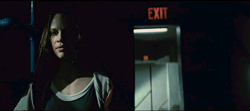 There's a scene near the beginning of Million Dollar Baby in which Clint Eastwood's character, Frankie Dunn, tells Morgan Freeman's character, Eddie "Scrap-Iron" Dupris, to buy the cheap, generic bleach to clean up around the gym. "Scrap" tells Frankie that the cheap stuff doesn't smell as good as the real Clorox bleach. "Bleach," Frankie says in turn, "smells like bleach." This is a line that, in any other movie, would have probably been meant for a small chuckle or a throwaway. In Million Dollar Baby, however, that very conversation about bleach tells more about the transformation that takes place within Frankie Dunn throughout the film than any other moment in the film.
There's a scene near the beginning of Million Dollar Baby in which Clint Eastwood's character, Frankie Dunn, tells Morgan Freeman's character, Eddie "Scrap-Iron" Dupris, to buy the cheap, generic bleach to clean up around the gym. "Scrap" tells Frankie that the cheap stuff doesn't smell as good as the real Clorox bleach. "Bleach," Frankie says in turn, "smells like bleach." This is a line that, in any other movie, would have probably been meant for a small chuckle or a throwaway. In Million Dollar Baby, however, that very conversation about bleach tells more about the transformation that takes place within Frankie Dunn throughout the film than any other moment in the film.When we first meet Frankie Dunn, he's beaten down and disheveled. His fighter wins another bout, but after the fight has to face the humiliation of helping Frankie push his car out of its parking spot because it refuses to go in reverse. Such is the life of a trainer who was once "the best cut man in the business," but has now been left to train fighters in an aging gym that barely makes money. Frankie's been hurt before and he's made some mistakes. He's a guy who knows and loves the "sweet science" of boxing - can't get it out of his blood, in fact - but can't stand to watch his fighters get hurt. He "protects" his fighter out of a title shot. He can't take the pain. Not anymore, at least.
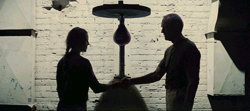 And when we meet Frankie, pretty much everything is black and white in his eyes. "Bleach smells like bleach," he says. It's not about "getting your shot" or at least making a run for the title. Nothing less than winning that fight is worth it to Frankie. It's simply not worth the pain to get there and lose. Everything is black and white. "I don't train girls," he says. That is, until he meets Maggie Fitzgerald and all that he knows suddenly changes. And once, with the help of Maggie's stubborn nature and tendency to not do what Frankie says, he begins a transformation that will effect every single decision he makes throughout the rest of the film.
And when we meet Frankie, pretty much everything is black and white in his eyes. "Bleach smells like bleach," he says. It's not about "getting your shot" or at least making a run for the title. Nothing less than winning that fight is worth it to Frankie. It's simply not worth the pain to get there and lose. Everything is black and white. "I don't train girls," he says. That is, until he meets Maggie Fitzgerald and all that he knows suddenly changes. And once, with the help of Maggie's stubborn nature and tendency to not do what Frankie says, he begins a transformation that will effect every single decision he makes throughout the rest of the film.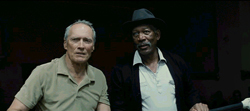 The reason I go into such great detail about Frankie's transformation in Million Dollar Baby is that, aside from everything you've already read about the film and all the controversy that surrounded it, Frankie's journey is just as important to the film as Maggie's. So much has already been written about how great a film Clint Eastwood has crafted that there's not a whole lot left for me to say in that department. Everything you've read is true. Million Dollar Baby is an astonishingly good piece of cinema. It has heart where most films do not, and it takes chances that most modern films would never even imagine taking. It was my favorite film of 2004, and will most likely stay one of my favorite films for a very long time. That being said, I decided not to talk mainly about why the film is so great, how wonderful the acting and directing are, how Hilary Swank got into such good shape for the film, and how people have claimed that many of the film's characters are stereotypical. Been there, read that.
The reason I go into such great detail about Frankie's transformation in Million Dollar Baby is that, aside from everything you've already read about the film and all the controversy that surrounded it, Frankie's journey is just as important to the film as Maggie's. So much has already been written about how great a film Clint Eastwood has crafted that there's not a whole lot left for me to say in that department. Everything you've read is true. Million Dollar Baby is an astonishingly good piece of cinema. It has heart where most films do not, and it takes chances that most modern films would never even imagine taking. It was my favorite film of 2004, and will most likely stay one of my favorite films for a very long time. That being said, I decided not to talk mainly about why the film is so great, how wonderful the acting and directing are, how Hilary Swank got into such good shape for the film, and how people have claimed that many of the film's characters are stereotypical. Been there, read that.So, without giving anything away, I mention all this background about Frankie's great transformation because it directly relates to all the controversy that surrounded the film upon its release. Whether or not you agree or disagree with what Frankie (and, essentially, Maggie) do near the end of the film does not make one iota of a difference. Everyone has their opinion and that's fine, but the more important question is whether or not you believe that Frankie and Maggie would have made the decision that they make. It's a difficult question, to be sure, but the way that Million Dollar Baby sets up Frankie and Maggie's characters throughout the first half of the film, the answer to that question becomes strikingly clear as a resounding "yes." It is totally believable that these characters would do exactly what they do near the end of the film. That's the thing that I find so baffling about all the controversy. Million Dollar Baby isn't preaching to you. It's not telling you to act in this way, were you ever in the situation, but it's simply showing you what Frankie and Maggie do. It is absolutely true to their characters at that point in the film, and for that, everyone involved with the film should be applauded for finding the truth in these people.
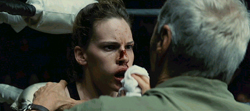 I've said it before, and I'll say it again: believe everything you've read about how great a film Eastwood has crafted with Million Dollar Baby. The performances are excellent all around, the boxing scenes are realistic, punishing, and brutal, and the film has some great unexpected, intelligent twists that makes it much more interesting than the film's first half would lead you to expect. It deserves every single Oscar® it received. Rarely do we see a transformation as dramatic as the one that Frankie Dunn undergoes in Million Dollar Baby. And rarely do we see that transformation come about as a result of a female that isn't exactly a love interest. What Maggie Fitzgerald does to Frankie Dunn is much more than just show him that she can fight, that he was wrong about training girls, and that sometimes the greatest knockout is one that doesn't come from your fists. She reminds him that bleach doesn't always smell like bleach. And that is something that he'll carry with him for the rest of his life.
I've said it before, and I'll say it again: believe everything you've read about how great a film Eastwood has crafted with Million Dollar Baby. The performances are excellent all around, the boxing scenes are realistic, punishing, and brutal, and the film has some great unexpected, intelligent twists that makes it much more interesting than the film's first half would lead you to expect. It deserves every single Oscar® it received. Rarely do we see a transformation as dramatic as the one that Frankie Dunn undergoes in Million Dollar Baby. And rarely do we see that transformation come about as a result of a female that isn't exactly a love interest. What Maggie Fitzgerald does to Frankie Dunn is much more than just show him that she can fight, that he was wrong about training girls, and that sometimes the greatest knockout is one that doesn't come from your fists. She reminds him that bleach doesn't always smell like bleach. And that is something that he'll carry with him for the rest of his life.The DVD
Video:
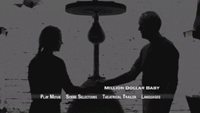 Million Dollar Baby is presented in an anamorphic 2.35:1 widescreen format that looks absolutely stunning. The film's dark color scheme is beautifully presented with rich blacks and starkly contrasting whites and grays. While most of the film chooses to employ these darker hues, the few scenes that do employ more vibrant colors are bright and vivid. Fleshtones are accurate, color saturation is spot-on, and detail is extremely intricate and deep. Shadows and lighting, which play a major role in the film's look, are extremely well delineated. The only minor issue that I could find with this transfer is the slightest hint of shimmering and edge enhancement. The problem, however, is so negligible that most viewers won't even be able to see it. Nonetheless, this is an absolutely wonderful visual presentation that makes Million Dollar Baby look like a million bucks.
Million Dollar Baby is presented in an anamorphic 2.35:1 widescreen format that looks absolutely stunning. The film's dark color scheme is beautifully presented with rich blacks and starkly contrasting whites and grays. While most of the film chooses to employ these darker hues, the few scenes that do employ more vibrant colors are bright and vivid. Fleshtones are accurate, color saturation is spot-on, and detail is extremely intricate and deep. Shadows and lighting, which play a major role in the film's look, are extremely well delineated. The only minor issue that I could find with this transfer is the slightest hint of shimmering and edge enhancement. The problem, however, is so negligible that most viewers won't even be able to see it. Nonetheless, this is an absolutely wonderful visual presentation that makes Million Dollar Baby look like a million bucks.
Sound:
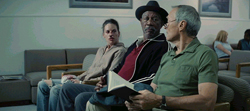 The audio on this disc is presented in a Dolby Digital 5.1 format that does an excellent job of providing the emotional cues of quieter scenes while also showcasing the brutal effects of the action-filled boxing scenes. Dialogue is always clear, crisp, and distinct, which is especially important in the quieter scenes near the end of the film. The soundtrack is well balanced across all channels, and spatial separation is very good. The score comes through beautifully, especially when helped by the surround channels, and never overwhelms the rest of the track. The discrete surrounds do a wonderful job of providing ambience throughout the film, but they really earn they keep during the boxing scenes. The rear channels provide enough crowd noise and other surround effects to place you right in the middle of the action, while the .1 LFE channel brings the low-end frequencies into your living room with each and every landed punch. What makes this track so good, however, are not the pulse-pounding effects of the boxing scenes. It is, instead, the track's dynamic range, which allows Million Dollar Baby to sound great whether it's during an action scene or a much quieter dialogue scene. That is what makes this track an excellent audio presentation for an excellent film.
The audio on this disc is presented in a Dolby Digital 5.1 format that does an excellent job of providing the emotional cues of quieter scenes while also showcasing the brutal effects of the action-filled boxing scenes. Dialogue is always clear, crisp, and distinct, which is especially important in the quieter scenes near the end of the film. The soundtrack is well balanced across all channels, and spatial separation is very good. The score comes through beautifully, especially when helped by the surround channels, and never overwhelms the rest of the track. The discrete surrounds do a wonderful job of providing ambience throughout the film, but they really earn they keep during the boxing scenes. The rear channels provide enough crowd noise and other surround effects to place you right in the middle of the action, while the .1 LFE channel brings the low-end frequencies into your living room with each and every landed punch. What makes this track so good, however, are not the pulse-pounding effects of the boxing scenes. It is, instead, the track's dynamic range, which allows Million Dollar Baby to sound great whether it's during an action scene or a much quieter dialogue scene. That is what makes this track an excellent audio presentation for an excellent film.
Extras:
For a three-disc "deluxe edition," this set contains a surprisingly small amount of extra material. The three main supplements are found on the second disc, and add up to approximately an hour's worth of features.
The first, and best, extra on the second disc is a 20-minute featurette called "Born to Fight." A compilation of talking-head interviews and film clips, the featurette - mostly through the eyes of real-life boxer and actress Lucia Rijker (she plays "Billie The Blue Bear" in the film) - examines the sport of boxing in Million Dollar Baby. Hilary Swank, Clint Eastwood, Morgan Freeman, Jay Baruchel, and Anthony Mackie also lend their thoughts to this featurette, but it mostly belongs to Rijker as she talks about what it's like to be a fighter and how Maggie Fitzgerald's story parallels some aspects of her own life. The participants also talk more generally about the film, its story, and its characters, but the main focus here is on the influence of boxing itself. "Born to Fight" is, ultimately, an interesting and insightful featurette, but there are a few too many clips from the film included leading to a more produced feeling than I would have preferred.
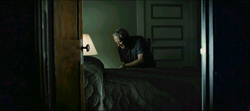 Also included is a 13-minute featurette called "The Producers' Round 15," which employs the same interviews-mixed-with-clips approach as the first feature. Beginning with a very appropriate quote about moviemaking from Clint Eastwood, the participants this time around include Producer Albert S. Ruddy, Producer/Screenwriter Paul Haggis, and Producer Tom Rosenberg. They speak candidly about the difficult task of bringing F.X. Toole's Rope Burns to the big screen as Million Dollar Baby. Ruddy is, by far, the most entertaining as he talks about how he had to get Toole drunk in order to get him to sign over the film rights. Otherwise, we hear the usual chatter about the screenwriting process from Haggis (and how surprised he was that Eastwood wanted to shoot his first draft), and the customary back patting from Rosenberg. Not nearly as engaging or insightful as "Born to Fight," this featurette is still a worthwhile addition to the film.
Also included is a 13-minute featurette called "The Producers' Round 15," which employs the same interviews-mixed-with-clips approach as the first feature. Beginning with a very appropriate quote about moviemaking from Clint Eastwood, the participants this time around include Producer Albert S. Ruddy, Producer/Screenwriter Paul Haggis, and Producer Tom Rosenberg. They speak candidly about the difficult task of bringing F.X. Toole's Rope Burns to the big screen as Million Dollar Baby. Ruddy is, by far, the most entertaining as he talks about how he had to get Toole drunk in order to get him to sign over the film rights. Otherwise, we hear the usual chatter about the screenwriting process from Haggis (and how surprised he was that Eastwood wanted to shoot his first draft), and the customary back patting from Rosenberg. Not nearly as engaging or insightful as "Born to Fight," this featurette is still a worthwhile addition to the film.
The third, and final, extra on the second disc is a 25-minute interview segment called "James Lipton Takes on Three." Most people probably know Lipton as the host of his own interview show called Inside the Actor's Studio. Or, better yet, maybe you know him from the hilarious Will Ferrell impression on Saturday Night Live. Either way, you probably already know that Lipton is just about one of the most annoyingly pretentious guys on the planet. His signature stack of blue note cards contain some of the silliest self-congratulatory questions one could pose to an actor. Why Warner Bros. chose to allow Lipton to host a roundtable interview with Eastwood, Swank, and Freeman is beyond me. Nevertheless, the interview takes place the morning after Million Dollar Baby snagged four Oscars®. The actors mostly repeat things that we've already heard in the previous segments and sometimes seem baffled by the absurdity of some of Lipton's questions. There's not a whole lot to be gleaned from this feature, except maybe learning that Eastwood does yell "Action!" at the beginning of takes, and that Morgan Freeman fancies himself a bit of a dancer. A different approach (or maybe a different host) might have made this featurette interesting, but unfortunately we're stuck with Lipton.
Also included in this "deluxe edition" is a third disc that is actually a Million Dollar Baby CD soundtrack. Eastwood's beautifully southern score is collected on this compact disc that is identical to the stand-alone CD soundtrack that was released around the same time as the film hit theaters. The CD sounds just fine and for someone, like myself, who collects soundtracks this is an excellent addition to the Million Dollar Baby package. Keep in mind, however, that there is also a 2-disc version of the DVD that contains all the same extra material found on this set except for the soundtrack CD. The inclusion of the soundtrack, in my opinion, is enough to warrant purchasing the 3-disc set, but if you already own the soundtrack CD then you may want to opt for the simpler set.
Finally, included on the first disc, is the theatrical trailer for Million Dollar Baby.
Final Thoughts:
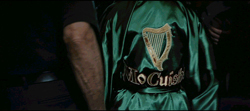 Million Dollar Baby went from being a small Clint Eastwood project that endured several snags along the way toward getting made, to being the critical darling of 2004 and the best boxing film since Raging Bull. It is simply that good. Eastwood just seems to get better with age, Hilary Swank proves that Boys Don't Cry wasn't a fluke, and Morgan Freeman is Morgan Freeman. Add to that an interesting cast of supporting characters, a couple well choreographed, realistic fight scenes, and a twist that will put you down for the count and you've got one of the best films to hit the cinemas in several years. Put aside all the controversy, and you've got a film that has an incredible amount of heart and characters that believably grow and change. What more can I say? Million Dollar Baby simply floored me.
Million Dollar Baby went from being a small Clint Eastwood project that endured several snags along the way toward getting made, to being the critical darling of 2004 and the best boxing film since Raging Bull. It is simply that good. Eastwood just seems to get better with age, Hilary Swank proves that Boys Don't Cry wasn't a fluke, and Morgan Freeman is Morgan Freeman. Add to that an interesting cast of supporting characters, a couple well choreographed, realistic fight scenes, and a twist that will put you down for the count and you've got one of the best films to hit the cinemas in several years. Put aside all the controversy, and you've got a film that has an incredible amount of heart and characters that believably grow and change. What more can I say? Million Dollar Baby simply floored me.
Warner Bros. has seen fit to offer the film in two versions: a 2-disc set and the 3-disc set that I've discussed here. Everything is the same except for the inclusion of the CD soundtrack in the 3-disc set, so if you can live without the soundtrack (or already own it), then the 2-disc version should suit you fine. Either way, you'll be getting the best film of 2004 in a stunningly beautiful transfer, an excellent audio presentation, and a few nice extra features. A more lavish set of extra features (and the dumping of the James Lipton segment) would have made me much happier, but the fact that a few of the extras are worthwhile, and Million Dollar Baby is such a great film, makes it easy for me to tell you that this DVD comes highly recommended.
|
| Popular Reviews |
| Sponsored Links |
|
|
| Sponsored Links |
|
|
| Release List | Reviews | Shop | Newsletter | Forum | DVD Giveaways | Blu-Ray | Advertise |
|
Copyright 2024 DVDTalk.com All Rights Reserved. Legal Info, Privacy Policy, Terms of Use,
Manage Preferences,
Your Privacy Choices | |||||||













